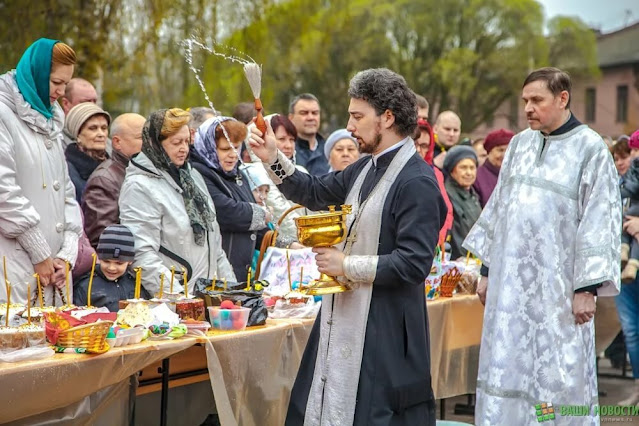Easter, or the Resurrection Sunday is the most important religious holiday for Christians.
Russians have always been religious people. And with the adoption of Orthodox (in 988) there appeared tradition to paint eggs and prepare special dishes on the Feast of Easter.
The Slavs were pagans and at the end of winter celebrated the Maslenitsa, during which they said goodbye to the winter and met the spring.
Of course, spring did not come at once. Usually in Russia spring came in late March or early April. And during this period there was a holiday of awakening of nature.
Traditionally, on that day, they danced horovod, lit bonfires (so that there was more heat in spring and summer), and poured water on each other (for a good harvest).
After the adoption of Christianity (in 988), the Maslenitsa, which the Slavs loved, entered the Orthodox tradition under the name of "Cheese Week".
After the Maslenitsa week, the Great Lent came, the period when Orthodox Christians prepare for the great feast of Easter.
During fasting, people often go to church, attend services, confess, receive communion, and refuse to eat animal food, as Jesus did in the desert for 40 days.
The great Orthodox fast begins right after the Maslenitsa, lasts 49 days and ends on Great Sunday - Easter.
The last Lenten week is called Holy Week.
This is the last 6 days before Easter, during which we remember the Last Supper, the betrayal of Judah, the judgment on Jesus, the crucifixion and burial.
On Thursday - "Great, or Pure Thursday" - Orthodox Christians always visit the church and confess, receive communion. And on this day, according to traditions, they cleaned the house, cooked kulich (Easter bread) and painted eggs. All preparations on Sunday's holiday are held on Thursday, since on Friday they do nothing and do not eat at all.
On Saturday, cakes and eggs are brought to the church for consecration - the priest watered with holy water, so he allows eating this food after the Lent.
Also on Saturday in Jerusalem a blessed fire comes down, or the Holy Light, as a symbol of the resurrection of Jesus Christ.
And this fire goes to all the churches. And in the Orthodox churches begins the night Easter service.
The usual service begins at 23: 00-23: 30. At midnight the procession is held, and then the morning service begins, which ends at 3 am.
And on Sunday comes the Great holiday - Easter, or Resurrection of Christ, or the Bright Resurrection of Christ.
On this day the Lent is over and you can break fast, that is, you can already eat food of animal origin.
Russian this day begins with the beating of eggs - "hristovanie" (you need to break the eggs from different sides) and try the kulich, pasks (curd cake).
In addition, on this day everyone greets with words
Every year the Orthodox Easter takes place on different days and does not always coincide with a similar holiday in other religions. And all because the Orthodox Church adheres to the Julian calendar.
Of course, spring did not come at once. Usually in Russia spring came in late March or early April. And during this period there was a holiday of awakening of nature.
Traditionally, on that day, they danced horovod, lit bonfires (so that there was more heat in spring and summer), and poured water on each other (for a good harvest).
After the adoption of Christianity (in 988), the Maslenitsa, which the Slavs loved, entered the Orthodox tradition under the name of "Cheese Week".
After the Maslenitsa week, the Great Lent came, the period when Orthodox Christians prepare for the great feast of Easter.
During fasting, people often go to church, attend services, confess, receive communion, and refuse to eat animal food, as Jesus did in the desert for 40 days.
The great Orthodox fast begins right after the Maslenitsa, lasts 49 days and ends on Great Sunday - Easter.
The last Lenten week is called Holy Week.
This is the last 6 days before Easter, during which we remember the Last Supper, the betrayal of Judah, the judgment on Jesus, the crucifixion and burial.
On Thursday - "Great, or Pure Thursday" - Orthodox Christians always visit the church and confess, receive communion. And on this day, according to traditions, they cleaned the house, cooked kulich (Easter bread) and painted eggs. All preparations on Sunday's holiday are held on Thursday, since on Friday they do nothing and do not eat at all.
On Saturday, cakes and eggs are brought to the church for consecration - the priest watered with holy water, so he allows eating this food after the Lent.
Also on Saturday in Jerusalem a blessed fire comes down, or the Holy Light, as a symbol of the resurrection of Jesus Christ.
And this fire goes to all the churches. And in the Orthodox churches begins the night Easter service.
The usual service begins at 23: 00-23: 30. At midnight the procession is held, and then the morning service begins, which ends at 3 am.
And on Sunday comes the Great holiday - Easter, or Resurrection of Christ, or the Bright Resurrection of Christ.
On this day the Lent is over and you can break fast, that is, you can already eat food of animal origin.
Russian this day begins with the beating of eggs - "hristovanie" (you need to break the eggs from different sides) and try the kulich, pasks (curd cake).
In addition, on this day everyone greets with words
"Христо́с Воскре́се!" ("Christ is Risen!"),
and answer
"Вои́стину Воскре́се!" ("Truly Risen!")
Every year the Orthodox Easter takes place on different days and does not always coincide with a similar holiday in other religions. And all because the Orthodox Church adheres to the Julian calendar.
Pictures from yandex.ru.
👉
Russian




No comments:
Post a Comment